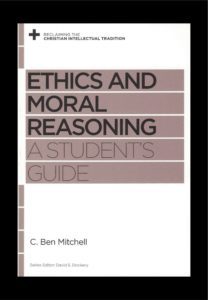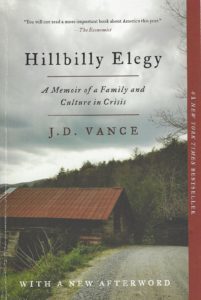Stephen W. Hiemstra's Blog, page 176
October 22, 2019
Mitchell Simplifies Christian Ethics, Part Two
 Ben Mitchell. 2013. Ethics and Moral Reasoning: A Student’s Guide. Wheaton: Crossway.
Ben Mitchell. 2013. Ethics and Moral Reasoning: A Student’s Guide. Wheaton: Crossway.
Review by Stephen W. Hiemstra
A key insight in my personal study of ethics is simple. Because everyone interprets an event through their own lens, ethics focuses on interpretation. Whose interpretation has the most merit and why?
Introduction
In his book, Ethics and Moral Reasoning, Ben Mitchell writes:
“Although every person may pursue the human telos, Christians enjoy the aid of the indwelling presence of the Holy Spirit, who motivates them both to will and to do God’s God pleasure as they follow the path of the Lord Jesus.” (97)
If Jesus is my measure of everything in life—Jesus is my denominator—then with the help of the Holy Spirit I am better able to navigate our shark-infested world than by adopting any ethical school of thought, no matter how sophisticated.
In part one of this review, I give a general outline of Mitchell’s work. In part two, I will summarize his views on biblical, enlightenment, and Evangelical ethical thinking.
Biblical Ethics
Biblical ethics is important enough to Mitchell that he about a third of his book to it written in two chapters. In his chapter on the Old Testament, Mitchell starts by surveying a number of hot-button issues, including:
Marriage and family
Labor and vocation
Sanctity and dignity of human life
Infanticide and abortion
Gladiatorial brutality
Gender equality
Racial equality (32-38).
Many of these issues were axiomatic until the demise of Christendom within the last generation. In the absence of consensus on basic issues, church teaching on these issues cannot be assumed. Pastors find themselves triaging fundamental church doctrines against an increasingly more limited attention span of their congregations and frequently open hostility to many traditional interpretations of scripture.
After surveying these issues, Mitchell moves to examining each of Ten Commandments (38-52). Mitchell offers these general insights into the Commandments:
The law expresses general principles, not case law.
The law is given by God himself.
Any offense against the law is an offense against the law giver.
Biblical law is the foundation for Western jurisprudence (38-39).
This last point is important. Questions about biblical law’s applicability have the potential to cascade through the rest of Western jurisprudence.
In his discussion of the New Testament, Michell focuses on Jesus’ Sermon on the Mount and initiates a discussion of natural law. He writes:
“To claim that there is a natural law is to claim that there is a normative moral order governed by that law, not by mere convention or mutual agree.” (61)
This is no small point. In putting forward new teaching on homosexuality in the church, denominations offering this teaching are disputing the doctrine of natural law (and the divine inspiration of scripture) that binds us irrespective of public opinion or the ruling of church leaders.
Enlightenment Ethics
Concerning the Enlightenment, Mitchell writes:
“Can we be good without God and his revelations? Many thinkers of the Enlightenment thought so. The religious wars in Europe from the sixteenth to eighteenth centuries did not leave people flush with confidence that agreement on faith, ethics, and politics was possible. The Enlightenment or age of reason was in many ways a response to this dilemma.” (65)
The idea that truth could be discovered independent of theological assumptions, while novel, proved impossible to validate philosophically. Secularism has proven to be a Christian heresy, quite unworkable when separated from its Christian foundations because other foundations cannot be found or are typically arbitrarily inserted. If this is unclear, ask yourself what justification exists for human rights, absent being created in the image of God and being loved by God.
Evangelical Ethics
For Mitchell, evangelical ethics stems from God and scripture. He writes:
“The Bible is the norming norm or revealed basis for evangelical reflections about the true, the good, and the beautiful. It is against the canon (rule) of Scripture that evangelical seek to compare and contrast all moral teaching.” (77)
Citing Kyle Fedler, Mitchell outlines these guidelines for interpreting scripture:
No single method for the use of scripture is adequate.
Whenever possible, the Bible should be read in its historical and cultural context.
Not all scripture carries the same normative weight.
Although Scripture is primary, normative, and authoritative, it is not our only source of guidance and wisdom. (93-95)
The evangelical rule, in so many words, is: the Bible says it, that settles it. However, scholars like Fedler suggest that in practice this rule is hard to apply rigorously.
Assessment
Ben Mitchell’s Ethics and Moral Reasoning: A Student’s Guide is a gem. It provides a short, concise statement of a Christian ethical perspective.
Footnotes
https://www.uu.edu/programs/stm/facul...
Mitchell Simplifies Christian Ethics, Part Two
Also See:
Mitchell Simplifies Christian Ethics, Part One
Bonhoeffer Introduces Christian Ethics, Part 1
Top 10 Book Reviews Over the Past 12 Months
Other ways to engage online:
Author site: http://www.StephenWHiemstra.net, Publisher site: http://www.T2Pneuma.com.
Newsletter: http://bit.ly/Run_2019
The post Mitchell Simplifies Christian Ethics, Part Two appeared first on T2Pneuma.net.
October 21, 2019
Storytelling: Monday Monologues, September 23, 2019 (podcast)
 Stephen W Hiemstra, 2018
Stephen W Hiemstra, 2018By Stephen W. Hiemstra
This morning I will share a prayer and reflect on Storytelling.
After listening, please click here to take a brief listener survey (10 questions).
To listen, click on the link below:
https://t2pneuma.net/wp-content/uploads/2019/08/Show_Dont_Tell_Monday_Monologues_20190926.mp3
Hear the words; Walk the steps; Experience the joy!
Storytelling: Monday Monologues, September 23, 2019 (podcast)
Also see:
Monday Monologue On March 26, 2018
Other ways to engage online:
Author site: http://www.StephenWHiemstra.net, Publisher site: http://www.T2Pneuma.com.
Newsletter: http://bit.ly/Run_2019
The post Storytelling: Monday Monologues, September 23, 2019 (podcast) appeared first on T2Pneuma.net.
October 20, 2019
Storyteller’s Prayer
 By Stephen W. Hiemstra
By Stephen W. Hiemstra
Holy Father, For your willingness to condescend to our level of understanding, we offer praise and glory to your name, great author of our faith (Heb 12:2 KJV).
Forgive us, Lord, for putting on airs and speaking above the comprehensive of our readers and listeners, thinking that we are better than them.
Yet, we give thanks for the gifts and talents that you have given us in the written and spoken word.
In the power of your Holy Spirit, lead us down the storylines that you would have us tell. Help us to show only what you would have us write. May our writing always lift up our readers and point them to you.
In Jesus precious name, Amen.
Storyteller’s Prayer
Also see:
Prayer for Healthy Limits
Other ways to engage online:
Author site: http://www.StephenWHiemstra.net, Publisher site: http://www.T2Pneuma.com.
Newsletter: http://bit.ly/Run_2019
The post Storyteller’s Prayer appeared first on T2Pneuma.net.
October 18, 2019
Storytelling
 “let your light shine before others,
“let your light shine before others,
so that they may see your good works and
give glory to your Father who is in heaven.”
(Matt 5:16)
By Stephen W. Hiemstra
Jesus told a lot of stories.
The importance of storytelling has been long recognized among clinical psychiatrists. Child psychologist, Bruno Bettelheim (1991) saw fairy tales as playing a key role in child development because the stories offered children a template for understanding their own emotional struggles. Biblical stories serve the same function rehearsing events from the past with current emotional and relational relevance.
Another psychiatrist, Milton Erickson, was famous for his ability to reach particularly difficult psychiatric patients through hypnosis. Still, even under hypnosis when presumably he had more leverage to offer patients suggestion, he preferred to tell them stories of healing rather than issuing directives. These stories of healing allowed him to step around the problem of patient resistance while giving the patient a template for resolving their issues on their own (Rosen 1982).
Recognizing Stories during Pastoral Visits
Savage (1998) suggests using stories to identify emotional content in the context of pastoral visits. Savage cites five classes of stories as particularly helpful to recognize:
1. Reinvestment stories where our loyalties change dramatically, as in switching careers—economist becomes pastor is one of my stories.
2. Rehearsal stories where events from the past have current meaning, such as Bible narratives.
3. “I know someone who” stories which oftentimes mask the true storyteller.
4. Anniversary stories which occur regularly at a particular calendar time, such as Christmas.
5. Transition stories which are three part stories, such as a trip to the hospital (why, what happened, and what comes next) (Savage 1998, 95).
Savage makes the point that we cannot help but tell our stories. It is particularly interesting when you catch yourself telling a story, perhaps one that you have told for years, and suddenly realize that that story captures a painful experience that you had either forgotten or suppressed.
The Parable of the Sower
Jesus’ Parable of the Sower, which is found in three of the four Gospels accounts, stands out because after telling the parable he explains its meaning to the disciples allowing Gospel readers the benefit of both left-brain and right-brain versions of the story.
Jesus’ use of this parable provides a template for preaching. Hearers of the Gospel not only have different responses to the message, reflecting the different types of soil that seeds can fall on, they also learn differently. Some respond to allegory and metaphor; others just want to have things explained. A sermon can accommodate each of these needs through use of prayers, personal stories, scripture readings, and didactic lessons. If the sermon’s theme is also reinforced in the music, then the worship service can be a highly integrated means of communication.
The Good Example
Bad examples litter the landscape of the postmodern world where drug use is being de-criminalized, prostitution is being promoted as just another vocation, and shoot-them-up gaming has become a competitive sport. Even our news, kid shows, and prescriptions are subject to advertiser’s narratives. Just because you are paranoid doesn’t mean that they are not out to get you, as the saying goes.
With our eyes on Christ, each of us as Christians should strive to be a good role model. Much like good writers try to “show rather than tell” their stories, good Christians work to act out their faith on life’s stage where the lights never go out. Hypocrite is the Greek word for actor, who steps in and out of roles. Our role extends from birth to death. This is why we strive to improve our characters and habits with the help of the Holy Spirit.
Showing rather telling becomes particularly important in witnessing to people afflicted with pride, who refuse all straightforward attempts to offer advice much like Erickson’s psychiatric patients. Extremely intelligent and wealthy people often view themselves as too clever for everyone else, much like many teenagers. This implies that they need to learn for themselves, reflecting on the examples of others or stories told through film, theatre, conversation, or a well-chosen book.
References
Bettelheim, Bruno. 1991. The Uses of Enchantment: The Meaning and Importance of Fairy Tales (Orig Pub 1975). New York: Penguin Books.
Rosen, Sidney. 1982. My Voice Will Go with You: The Teaching Tales of Milton H. Erickson. New York: W.W. Norton.
Savage, John. 1996. Listening & Caring Skills: A Guide for Groups and Leaders. Nashville: Abingdon Press.
Show Don’t Tell
Also See:
Value Of Life
Other ways to engage online:
Author site: http://www.StephenWHiemstra.net, Publisher site: http://www.T2Pneuma.com.
Newsletter: http://bit.ly/Run_2019
The post Storytelling appeared first on T2Pneuma.net.
October 15, 2019
Mitchell Simplifies Christian Ethics, Part One
 Ben Mitchell. 2013. Ethics and Moral Reasoning: A Student’s Guide. Wheaton: Crossway.
Ben Mitchell. 2013. Ethics and Moral Reasoning: A Student’s Guide. Wheaton: Crossway.
Review by Stephen W. Hiemstra
My interest in ethics dates back to when as a young man I faced the Vietnam war and the draft without a clear understanding of what I was dealing with. What does God require of us here and now, in this situation, and why? Questions of life and death tend to grab you by the throat and refuse to let you go.
Introduction
In the preface to his book, Ethics and Moral Reasoning, Ben Mitchell writes:
“Few people need to be convinced of the importance of ethics. We live in a tragically flawed world where we are confronted daily with moral failures…This book is a guide to thinking about the good.” (15-17)
He goes on to write:
“Jesus described a trinity of moral relationships—to God, to others, and to self. These three relationships were to be ordered by the virtue of love. Importantly, when one of these relationships becomes disordered, the others are affected.” (19)
Nouwen (1975, 20) refers to these three relationships as movements of the spirit, suggesting that what we believe and what we do are closely related. Much of what we do arises, especially in a professional sense, arises out of our identities.
As Christians, our identity naturally flows from our understanding of who Jesus is. Mitchell’s commitment to a Christian ethical understanding is summarized as:
“Although every person may pursue the human telos, Christians enjoy the aid of the indwelling presence of the Holy Spirit, who motivates them both to will and to do God’s God pleasure as they follow the path of the Lord Jesus.” (97)
In his final paragraph he asks: “What does it mean to be truly human?” (98) The answer to this question often given by Christians is that we more closely reflect the image in which we were created (Gen 1:27).
Background and Organization
Ben Mitchell has a doctorate from University of Tennessee, a masters of divinity from Southwestern Baptist Theological Seminary, and is a grade of Mississippi State University. He is currently on the faculty at Union University in Tennessee. His focus is bioethics and he is widely published.
Mitchell writes in six chapters:
“The Challenges of a Relativist World
The History of Moral Reasoning, Part 1
The History of Moral Reasoning, Part 2
Enlightenment Ethics
Evangelical Ethics
Using the Bible in Moral Decision Making” (9)
These chapters are preceded by two prefaces and acknowledgments and followed by conclusions, an appendix, questions for reflection, a timeline, glossary, resources for further study, and two indices. In his scriptural index, the vast majority of citations are from Genesis (creation), Exodus (Ten Commandments), and Matthew (Sermon on the Mount).
Confronting Relativism
Concerning the pervasive influence of relativism, Mitchell observes:
“relativism is morally crippling because relegates ethical discussions to the personal, private, and subjective, and to the realm of mere preference.” (34)
He terms this view normative ethical relativism because it suggests not only what is, but what should be. Citing Louis Pojman, it stands on two premises: the diversity thesis, that “right and wrong differ from person to person and from culture to culture”. And the dependency thesis, that “morality depends on human nature, the human condition, or specific sociocultural circumstances, or a combination of all three.” (24-25) The diversity thesis is not normative, but simply observes that ethical practices differ between cultures. Mitchell devotes more attention to the dependency thesis.
Mitchell outlines five weaknesses of the dependency thesis that we care about:
Majority opinion can be wrong. For most of human history, the majority of people supported the institution of slavery.
Moral error is not possible, if the dependency thesis is true. Child sexual abuses is always wrong, irrespective of cultural context.
Moral reform makes no sense if relativism is true. Abraham Lincoln had no basis for criticizing slavery or Nelson Mandela for criticizing racial segregation, if relativism is true.
What is does not imply that it should be. Just because some Islamic and African nations practice female genital mutilation does not imply that is should be.
Relativism confuses moral practices and their underlying values. Signs of disrespect differ by culture, yet every culture honors respect. (27-29)
Citing James Q. Wilson, Mitchell observes that “every culture shares the values of sympathy, fairness, self-control, and duty” (30) suggesting that we share common moral values even if they are expressed differently among cultures.
Assessment
In part one of this review, I give a general outline of Mitchell’s work. In part two, I will summarize his views on biblical, enlightenment, and Evangelical ethical thinking.
Ben Mitchell’s Ethics and Moral Reasoning: A Student’s Guide is a gem. It provides a short, concise statement of a Christian ethical perspective.
Footnotes
https://www.uu.edu/programs/stm/facul....
References
Nouwen, Henri J. M. 1975. Reaching Out: The Three Movements of the Spiritual Life. New York: DoubleDay.
Mitchell Simplifies Christian Ethics, Part On
Also See:
Bonhoeffer Introduces Christian Ethics, Part 1
Top 10 Book Reviews Over the Past 12 Months
Other ways to engage online:
Author site: http://www.StephenWHiemstra.net, Publisher site: http://www.T2Pneuma.com.
Newsletter: http://bit.ly/Run_2019
The post Mitchell Simplifies Christian Ethics, Part One appeared first on T2Pneuma.net.
October 14, 2019
Downward Mobility: Monday Monologues, October 14, 2019 (podcast)
 Stephen W Hiemstra, 2018
Stephen W Hiemstra, 2018By Stephen W. Hiemstra
This morning I will share a prayer and reflect on Downward Mobility.
After listening, please click here to take a brief listener survey (10 questions).
To listen, click on the link below:
https://t2pneuma.net/wp-content/uploads/2019/09/Downward_Mobility_Monday_Monologues_20191014.mp3
Hear the words; Walk the steps; Experience the joy!
Downward Mobility: Monday Monologues, October 14, 2019 (podcast)
Also see:
Monday Monologue On March 26, 2018
Other ways to engage online:
Author site: http://www.StephenWHiemstra.net, Publisher site: http://www.T2Pneuma.com.
Newsletter: http://bit.ly/Run_2019
The post Downward Mobility: Monday Monologues, October 14, 2019 (podcast) appeared first on T2Pneuma.net.
October 13, 2019
Prayer for the Impoverished
 By Stephen W. Hiemstra
By Stephen W. Hiemstra
Almighty Father,
All praise and honor be to you for you shelter us from hurricanes and other storms in spite of our poverty of spirit and resources.
We confess that too often we are tight fisted and only remember our obligations when it benefits us directly or indirectly.
Yet, we thank you for sending your son to teach us hospitality and generosity of body and mind and spirit.
In the power of your Holy Spirit, grant us gentle reminders of our need for charity and grace, grant us strength for the day, grace for those we me, and peace that we might grow closer to you day by day.
In Jesus’ precious name, Amen.
Prayer for the Impoverished
Also see:
Prayer for Healthy Limits
Other ways to engage online:
Author site: http://www.StephenWHiemstra.net, Publisher site: http://www.T2Pneuma.com.
Newsletter: http://bit.ly/Run_2019
The post Prayer for the Impoverished appeared first on T2Pneuma.net.
October 11, 2019
Downward Mobility
 “There is neither Jew nor Greek,
“There is neither Jew nor Greek,
there is neither slave nor free,
there is no male and female,
for you are all one in Christ Jesus.”
(Gal 3:28)
By Stephen W. Hiemstra
My first ministry involved organizing a summer program for students in my parent’s new church home in McLean, Virginia in the late 1970s. The high school students loved this idea and I continued to organize the summer program throughout graduate school. Over these years, I saw one cohort of students after another progress through school, graduate, and move away, a process that I described as downward mobility. As a doctoral candidate with good prospects, I was one of the few able to live and find work in affluent Northern Virginia.
The Downwardly Mobile
This downward mobility is actually a phenomena facing most young people today. Studies show that real income in the United States has been relatively flat for college graduates since about 1980. The average student has a couple years of college before dropping out and, like high school graduates, has suffered a decline in real income since 1980. Only students with postgraduate work—maybe 10-20 percent of the population—have seen an increase in real income since 1980, generally associated with their ability to take advantage of changes in information technology—the hamburger helper of today’s professionals.
This downward mobility has placed economic pressure on many people making it hard to purchase a home or have a family. The disappearance of pensions and healthcare are a related problem. In the midst of this economic pressure, American society has increasingly been stratified by economic class. Throw in gender, race, and ethnicity, and you have a highly combustible mixture because no one feels better off. The decline in life expectancy over the past three years, due in part to record suicides and drug overdoses, is testimony to the stress that people feel.
Being the Church
In the middle of a chaotic social situation and pressure on budgets, how does the church resist the temptation to serve only the wealthier economic classes rather than the entire community? This is not an idle question.
Churches, like the Roman Catholics, that operate on the parish model are better able to serve the entire community than those that differentiate themselves based on their theological heritage, like most Protestant churches. A parish is defined geographically that should ideally serve both rich and poor neighborhoods equally.
A theologically defined church can attract one or another social group, depending on particular concerns. A church promoting the prosperity Gospel, for example, is much more likely to attract the economically-disadvantaged while the work-ethic of traditional Calvinist denominations, like the Presbyterians, is more likely to appeal to professional groups.
Irrespective of structure or theology, we are called as Christians to minister to and evangelize the entire community. Just because a stressful economy has raised the stakes, does not mean that we can neglect the mission.
The Special Problem of Immigration
Massive immigration from Latin American countries, particularly in Central America, has exacerbated class distinctions in America. Hispanic immigrants often speak no English and lack documentation that allows them to work in the United States. Political deadlock has led a humanitarian crisis at the border and the development of a rigid underclass in virtually every American city.
What makes this crisis interesting is that policy changes in the United States helped promote this immigration. Illegal drug use in America has prompted the growth of narco-trafficking and the development of drug gangs in Central America that has made life difficult in these countries. Meanwhile, the North American Free Trade Agreement (NAFTA) lowered the price of grain in Central America undermining the rural economy (where most of the immigrants used to work) after 1994.
Complicating matters, the lack of population growth has created an urgent need for workers in the United States in low wage industries, such as janitorial services, hospitality, construction, and agriculture.
Role for Churches
While immigration has met the need for workers and promoted economic growth, the Hispanic immigration has proceeded too quickly for immigrants to be legally and socially integrated into American society. Churches need to intervene to assist with both problems.
The biblical mandate to assist immigrants is obvious. In Exodus, we read:
“You shall not wrong a sojourner [immigrant] or oppress him, for you were sojourners in the land of Egypt. You shall not mistreat any widow or fatherless child. If you do mistreat them, and they cry out to me, I will surely hear their cry.” (Exod 22:21-23)
From a practical perspective I remind people that about a third of the children in the United States under the age of twenty share an Hispanic background. Another third are minorities. Learning to serve these groups today while the kids are young is an important investment in the future of congregational ministry that we dare not neglect.
Downward Mobility
Also See:
Value Of Life
Other ways to engage online:
Author site: http://www.StephenWHiemstra.net, Publisher site: http://www.T2Pneuma.com.
Newsletter: http://bit.ly/Run_2019
The post Downward Mobility appeared first on T2Pneuma.net.
October 8, 2019
Vance Chronicles White Poverty in America
 J.D. Vance.2018. Hillbilly Elegy: A Memoir of a Family and Culture in Crisis. New York: Harper.
J.D. Vance.2018. Hillbilly Elegy: A Memoir of a Family and Culture in Crisis. New York: Harper.
Review by Stephen W. Hiemstra
In the middle of the Second World War in 1944 a group of world leaders met in Breton Woods, New Hampshire to craft a monetary agreement that would come into effect after the war. In the agreement, the United States pegged the dollar to gold at a price of $26 per ounce. That agreement came to an end in 1971 when the United States announced that it could no longer defend the value of the dollar with gold. From that point forward, the rock-solid U.S. economy has been in transition.
Many people that took the opportunity to educate themselves and invest their money wisely during those prosperous years after the war pulled themselves out of poverty; others did not. In this latter case, J.D. Vance’s Hillbilly Elegy sees “a culture that increasingly encourages social decay instead of counteracting it.” (7) Ironically, he sees his own struggle with dysfunctionality paralleling that of other minority groups in America that have not moved ahead in spite of ample opportunity.
Introduction
Hillbilly Elegy is the memoir of one man who defied a legacy of isolation, poverty, and a dysfunctional family culture to become educated and gainfully employed. Of his background, Vance writes:
“I may be white, but I do not identify with the WASPs of the Northeast. Instead, I identify with the millions of working-class white Americans of Scots-Irish descent who have no college degree … Americans call them hillbillies, rednecks, or white trash. I call them neighbors, friends, and family.”(3)
In his description, Vance goes on to cite social isolation:
“Our religion has changed—built around churches heavy on emotional rhetoric but light on the kind of social support necessary to enable poor kids to do well. Many of us have dropped out of the labor force or have chosen not to relocate for better opportunities. Our men suffer from a peculiar crisis of masculinity in which some of the very traits that our culture inculcates make it difficult to succeed in a changing world.”(4-5)
Unfortunately, he does not elaborate on the changes that churches have undergone to reinforce this dysfunctional culture. He does, however, emphasize the oasis offered by his grandparents—in spite of their own obvious dysfunctions—that allowed him to graduate from high school and the encouragement they gave to his higher education (e.g. 253).
Detailed Dysfunction
Vance calls his grandparents Mamaw and Papaw, terminology used exclusively by his hillbilly community (23). Mamaw and Papaw grew up in Jackson, Kentucky but moved to Middletown, Ohio for fairly sketchy reasons—Bonnie was 16 and pregnant and James feared that her family would shoot him. Ohio offered the opportunity to find industrial work at Armco and join the middle class. Ironically, the pregnancy that prompted the move died in infancy (26-27).
Vance‘s mother was a nurse whose life was torn between an addiction and a never-ending rotation of men. Once he realized early in high school that the instability in his home life would never change, he moved in with his grandmother. He writes:
“Mamaw [a pistol-packing hillbilly] would kill anyone who tried to keep me from her. This worked for us because Mamaw was a lunatic and our entire family feared her.”(243)
Protected by his lunatic grandmother, Vance found stability in his high school years that allowed him to focus on his studies. He later joined the Marines which “taught me how to live like an adult”and enabled him to apply for Ohio State (174-77).
Ironically, he kept his relationship with his grandmother a secret, even from his close friends, because child protective services would not have honored this relationship and would probably have placed him in foster-care. He writes:
“Part of the problem is how state laws define the family. For families like mine—and for many black and Hispanic families—grandparents, cousins, aunts, and uncles play an outsize role.”(243)
This outsize role arises because even in dysfunctional families there is often someone willing to look out for a child at risk and function as a surrogate parent.
Assessment
J.D. Vance’s Hillbilly Elegy is a memoir of a young man who grew up in hillbilly family and found his way to Ohio State University and Yale Law school despite all odds against him. The craziness of his life and family make this an interesting read. At the time of publication in 2016 the media made this book a cult classic because it seemed—quite unfairly—to epitomize the typical Donald Trump voter in a manner like “Joe Six-pack”or the “Silent Majority”used to describe poor white voters, forgotten by the media and mainstream politicians between elections. Nevertheless, Hillbilly Elegyis likely to become and remain a classic study of cultural dysfunction.
https://en.wikipedia.org/wiki/J._D._V....
Vance Chronicles White Poverty in America
Also See:
Brooks Introduces the Bobos
Top 10 Book Reviews Over the Past 12 Months
Other ways to engage online:
Author site: http://www.StephenWHiemstra.net, Publisher site: http://www.T2Pneuma.com.
Newsletter: http://bit.ly/Run_2019
The post Vance Chronicles White Poverty in America appeared first on T2Pneuma.net.
October 7, 2019
Christian Distinctives: Monday Monologues, October 7, 2019 (podcast)
 Stephen W Hiemstra, 2018
Stephen W Hiemstra, 2018By Stephen W. Hiemstra
This morning I will share a prayer and reflect on Christian Distinctives.
After listening, please click here to take a brief listener survey (10 questions).
To listen, click on the link below:
https://t2pneuma.net/wp-content/uploads/2019/09/Christian_Distinctives_Monday_Monologues_20191007.mp3
Hear the words; Walk the steps; Experience the joy!
Christian Distinctives: Monday Monologues, October 7, 2019 (podcast)
Also see:
Monday Monologue On March 26, 2018
Other ways to engage online:
Author site: http://www.StephenWHiemstra.net, Publisher site: http://www.T2Pneuma.com.
Newsletter: http://bit.ly/Run_2019
The post Christian Distinctives: Monday Monologues, October 7, 2019 (podcast) appeared first on T2Pneuma.net.



